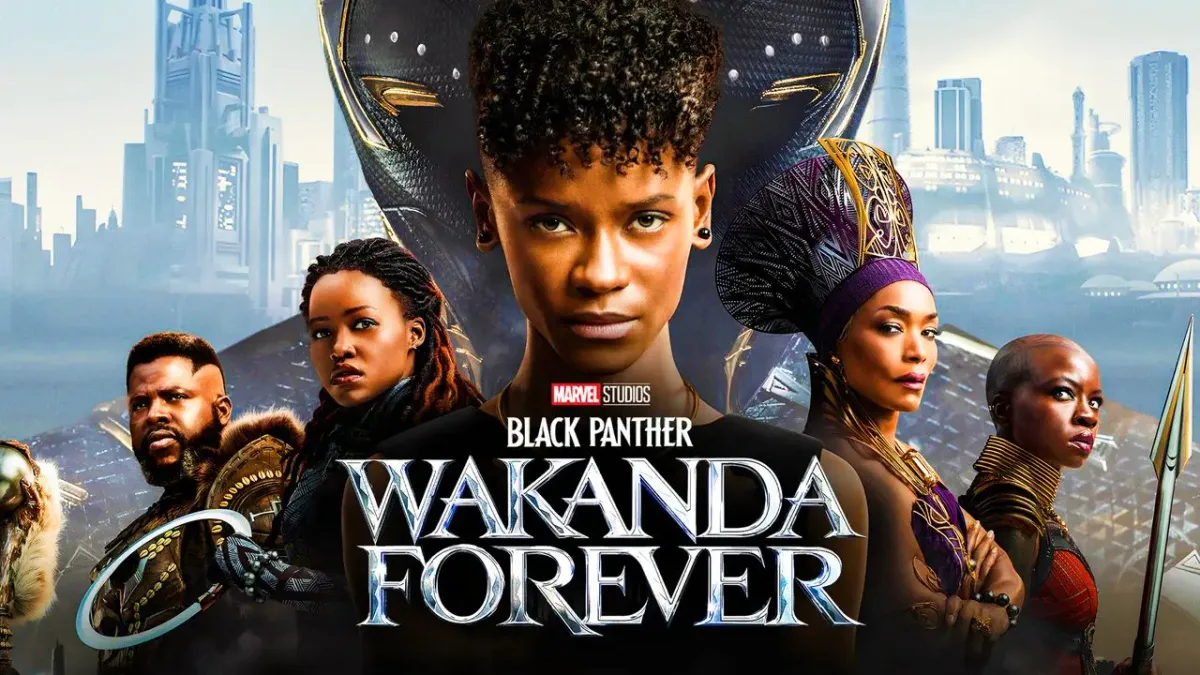“Black Panther” sequel moves series forward

The future of the “Black Panther” series was upended following the tragic death of Chadwick Boseman and the loss of his powerful portrayal of King T’Challa. Despite this hardship, though, the series pushed forward with its newest movie “Black Panther: Wakanda Forever.”
With Ryan Coogler returning as director, “Wakanda Forever” is a solid, thought-provoking entry in the Marvel Cinematic Universe, but it struggles to recreate the earth-shattering power of the original.
The film follows characters from its predecessor — specifically, T’Challa’s sister, Shuri (Letitia Wright), and mother, Queen Ramonda (Angela Bassett) — as they deal with Wakanda becoming a world superpower and the global arms race for the powerful metal vibranium. In the chaos, the isolationist underwater nation of Talokan, led by the godlike Namor (Tenoch Heurta) and with vibranium of its own, wages war on Wakanda to protect its way of life.
Similar to gripping themes in the origional “Black Panther,” what carries “Wakanda Forever” are the complex ideas it deftly explores.
Picking up where the original left off, the characters of “Wakanda Forever” deal with the struggle between isolationism, tradition and globalism. As Shuri and Ramonda grapple with the repercussions of the vibranium search, ideological divides sprout up, which threaten to destroy personal and national relationships. The movie also explores this by humanizing Namor’s nation and setting them up as a group of Mayans who survived the Spanish invasion by moving underwater and isolating themselves for fear of death.
It’s these similarities through conflict between Wakanda and Talokan which keep the plot realistic and moving.
Another major theme of the movie — which was natural given the death of Boseman — is the idea of loss and grief. Much like the world struggled with the sudden passing of Boseman, Coogler delves into how Wakanda and its people struggle to cope and find hope in the face of personal loss that reverberates throughout the country.
Giving additional weight to these themes is the powerful acting of the cast. Taking the mantle as lead of the series, Wright captures the anger and determination that Shuri feels after T’Challa’s death. Also cementing his place in the series is Winston Duke, returning as the tribe-leader M’Baku, who explores the gray areas of his complex character while adding a splash of comedy. Additionally, Heurta brings the villain Namor to life by showing the character’s pain created at the hands of colonizers.
The film also features a soundtrack that rivals that of the original. Composed by the returning Ludwig Göransson (“The Mandalorian,” “Creed”), the music seamlessly blends modern and traditional genres. Additionally, Rihanna conveys the raw emotion of the movie with her lead single, “Lift Me Up,” an inspiring tribute to Boseman.
Also returning is production designer Hannah Beachler (“Moonlight”), who paints a more vivid image of Wakanda through immersive set design and costuming. The film’s artistic design also highlights the culture of Talokan, a visually stunning nation.
While “Wakanda Forever” creates a powerful story through a mix of visuals and music, the film occasionally falters with confusing and unengaging plot points and decisions.
Considering the deep lore of Wakanda, which the first film immersed itself in, one letdown is how much of the new movie’s action takes place outside of the country. While this is necessary for the themes of the film, it’s less compelling than the self-contained drama of the original.
Coinciding with its global setting, “Wakanda Forever” also falls short due to the large scope of its story. With plot points focusing on the United Nations, the United States and Talokan, the complex, three-hour-long story can leave viewers with whiplash and confusion.
These weak points in the plot cause the movie to fall into the legacy of MCU sequels that don’t live up to their predecessors, but unlike those others, “Wakanda Forever” is still a powerful movie that keeps viewers engaged and moves the series forward in a hopeful direction following the loss of Boseman.



